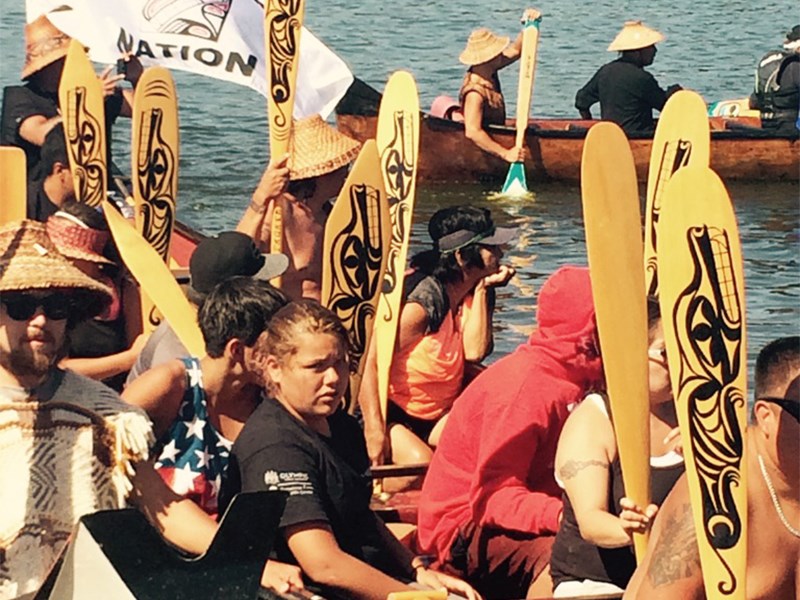When more than 100 canoes pull through the waters of the Pacific Northwest next month for the 2017 Tribal Canoe Journey, each stroke of the paddles will serve as an important step toward cultural restoration.
“We’ve been working on the revitalization of our traditional values and teachings and we learn through song and language,” said Tla’amin Nation citizen Cyndi Pallen (whose traditional name is Chennay). “It’s a good way to practice the language and also to practice the culture.”
This year’s event will be hosted in Campbell River by We Wai Kai Nation and Wei Wai Kum First Nation on Saturday, August 5. Having participated regularly since 2003, Tla’amin Nation will send approximately 60 people on the journey, spread between two canoes.
“Ours is called Ohtaqken, which in our language means ‘way of life,’” said Pallen. Her husband Sherman skippers the canoe and named it several years ago after listening to a language tape made by one of Tla’amin’s elders.
Adorned with cedar for extra protection, canoes will arrive from one of dozens of coastal territories between California and Alaska. Traditional protocol denotes that participants must first introduce themselves, recite the names of their parents and grandparents and then ask for permission before coming ashore.
“It grounds you in who you are as a person and also teaches young people how important it is to know where they’re from,” said Pallen. “Putting that into practice is a way of honouring our ancestors who travelled the waters.”
According to 2017 Tribal Canoe Journey director Jodi Simkin, it will take approximately five hours for all of the canoes to be called up to the beach.
“We expect upwards of 8,000 or 9,000 people on the Campbell River spit on the day they land and a public feast follows,” said Simkin. “It’s going to be pretty amazing for the canoe families and for spectators who haven’t had the chance to be a witness to this.”
With each iteration of the Tribal Canoe Journey, Pallen has noticed more and more youth on the quest to discover their ancestral roots, as well as many others who come back each year.
“Once they’ve experienced the journey they look forward to being able to go again,” said Pallen. “Everybody is at a different level for their personal growth.”
The oldest participant will be 90 years old in 2017; the youngest are often brought along as infants.
“My granddaughter has been on the journey now since she was a baby, actually,” said Pallen. “We brought her to places so she was exposed to it and she started paddling a couple years ago. She’s 12 now.”
For Pallen, the trip is especially significant because of the healthy interactions it promotes.
“You are among people who are working to change their lives,” she said. Organizers have put a big focus on team building, communication and respect, as well as an alcohol-free and drug-free atmosphere.
“It is most definitely a journey of healing, health and discovery,” said Simkin. “It reconnects people to the land and the air and the water in ways you cannot be connected to unless you have had that experience.”
The journey has also been known to strengthen bonds between communities that have been associated since time immemorial, but may have lost touch for a variety of reasons. Nations often take turns hosting one another as they camp along the route to their final destination.
“This really is an important step in reestablishing those cultural traditions that are shared among the coastal-corridor people of the Pacific Northwest,” said Simkin. “We couldn’t be more thrilled to welcome them.”



